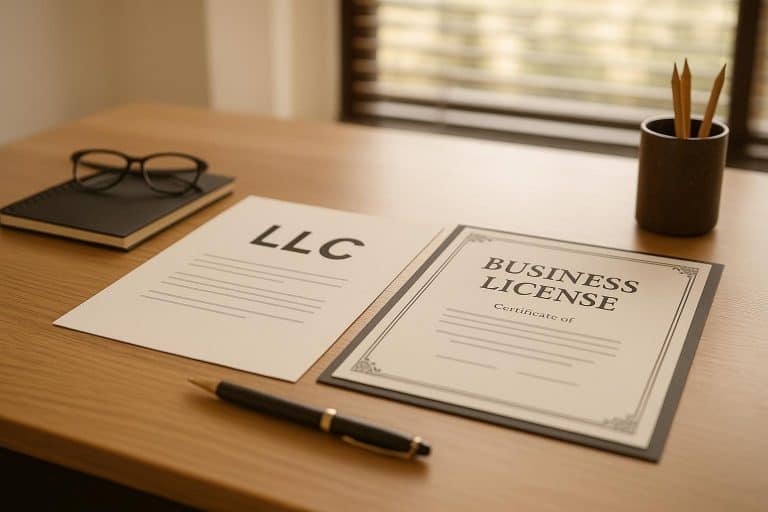[3 Minute Read]
Did you start your business as an LLC and now you’re looking for a way to change to a C corporation structure? Or maybe you’re about to incorporate your business and want to know how easy it’ll be to change your mind later on.
Either way, keep reading to find out how to convert an LLC to a C corporation.
This guide will briefly outline what’s an LLC and what’s a C corporation, what are the main differences between the two, why you might want to ditch the LLC structure for a C corporation, and how to do it.
Let’s get to it.
What’s an LLC?
An LLC (Limited Liability Company) is a smart hybrid structure. It’s considered as ‘the best of both worlds’ as far as business structures go. This is because an LLC offers limited liability and pass-through taxation.
What does this mean exactly? It means that the profits of the business are passed through to the owners and only taxed at the individual income level. This is similar to the partnership or sole proprietorship business structure however, an LLC provides limited liability to the owners. Making it a safer choice for business owners.
That’s the best of both worlds, being taxed like an individual while being protected like you run a corporation.
What’s a C Corporation?
A C corporation is the ‘standard’ corporation business structure. It has shareholders and a board of directors. The profits are distributed as dividends and often salaries to the shareholders. The corporation also has to pay its own tax on the profits.
All corporations have to fulfil certain criteria to maintain their corporation status. This often includes administrative tasks like regular board meetings and additional costs.
What’s the Difference Between an LLC and a C Corporation?
An LLC and a C corporation are very different. Here’s how…
- A C corporation can raise capital through stocks. This is not possible for an LLC. An LLC can sell ownership stakes.
- Owners of a C corporation own shares of stock in the company which they can transfer. The Corporation can also issue shares to their employees. An LLC can’t issue shares and the owners receive profit based on how much they invested into the company.
- A C corporation is taxed as a separate entity while the LLC passes its profits onto the owners.
For a full breakdown of the differences between an LLC and a C corporation head over to this article.
Why Convert an LLC to a C corporation?
Usually, founders change from an LLC to a C corporation structure because they either want to raise capital or offer equity to employees.
LLCs aren’t liked by investors because they’re considered to be risky and don’t offer much opportunity for investment. They’re the equivalent of a lemonade stand to investors. A corporation can go public (IPO) and offer shares to investors and the public to raise capital. LLCs are messier because they offer ownership stakes instead. At the end of the day, the corporation route is easier, especially when it comes to tax reporting.
Offering equity to employees is a promising way to bring talented people on board and keep them. Unfortunately, an LLC can only offer profits interest units to their employees. But generally speaking, this is a complicated process. A C corporation can offer different types of equity and it’s a much easier process for you and the employees.
How to Convert an LLC to a C Corporation?
In the US there are two ways you can convert an LLC to a C corporation. The easiest one is statutory conversion but some states don’t allow it. If you can’t do a statutory conversion, you’ll have to do a statutory merger.
How to Do a Statutory Conversion?
First of all, check if statutory conversion is legal in your state of incorporation.
If it’s allowed, then create a document that acts as the ‘conversion plan’ and get it approved by all members. Essentially, what you’re looking for is confirmation from all members that they agree with the conversion.
The next step is to file a Certificate of Conversion with your state. You’ll have to pay a fee. The fees vary from state to state. You also might have to provide additional documents to the state like your certificate of incorporation.
What will happen is the LLC will be converted into a Corporation and the members will become shareholders. The assets and liabilities will be transferred automatically. You will not have to dissolve your LLC, the state will convert it.
How to Do a Statutory Merger?
A statutory merger is slightly more complex and takes longer.
The first step of the statutory merger is to create a merger plan and get it approved by all members of the LLC.
Then, you’ll have to form a corporation. The LLC members must be the shareholders of the corporation.
The next step is to exchange the membership interest for shares in the corporation that you formed.
Afterwards, you’ll file a certificate of merger with the state and then you’ll have to dissolve the LLC.
As you can see, the merger has an additional few steps and is a little more complicated.
Professional Incorporation Service
We recommend hiring a professional service to start your corporation. It’ll save you time and headache.








